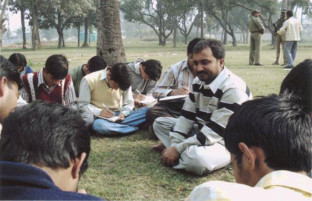
Patna: Renowned Bihar mathematician Anand Kumar, 41, has earned worldwide acclaim for transforming the life of hundreds of poor and unprivileged children through his free coaching institute, ‘Super-30’.
In the past 12 years, this institute, which was included in the Best of Asia-2010 by Time magazine and listed as one of the world’s four innovative schools by Newsweek, has helped around 300 unprivileged children fulfil their dream of cracking the entrance examination to the prestigious Indian Institute of Technology (IIT).
Kumar set up the coaching institute in 2002 after his own dream of studying in Cambridge University in Britain crashed midway due to severe financial crisis that hit the family.
“It gives a lot of pleasure when someone from us gets selected in the IIT examination. Now my own failure does not matter. The maximum I would have been was to become a professor at Cambridge teaching maths to the students but I would have lost the biggest opportunity of creating awareness about education among the poor class,” admits Kumar.
He, however, is shocked at the way billions of rupees are being wasted by political parties in their electoral campaigns.
The following are excerpts from an interview with Gulf News:
Gulf News (GN): The real issues concerning the common man seem to be lost in the election din resulting from accusations and counter-accusations made by politicians. What is your view on the matter?
Anand Kumar (AK): The common man forms a large section of society. BJP prime ministerial candidate Narendra Modi too talks about the “common man”. But, sadly no government has formed any policy which can benefit this deprived class. The condition of education is very pitiable in the country. It is generally divided into two parts — ‘Quality education’, which is restricted to a privileged few, and ‘Education for All’, which in other words mean complete lack of quality education. There are a number of government schools which do not have doors or windows, let alone basic facilities such as desks, power and water. Likewise, the condition of government hospitals is very pathetic but today no party talks about them. They are just trying to divert the people’s attention from real issues by systematically indulging in the practice of hurling charges at one another.
GN: You have been trying to empower the unprivileged class by providing free education, food and shelter to poor children. What feeling comes to your mind after watching billions wasted by political parties on campaigns to win elections?
AK: It pains me a lot after watching the huge amounts of money being frittered away on launching poll campaigns just for the sake of winning elections. India would have had a golden future had this money been used to set up quality schools across the country. A good leader is not required to publicise himself or his works. People know everything about them.
GN: Where do you see the common man standing out amid the high-pitched poll campaigns?
AK: The common man is quite disturbed and distraught now with the policies of the present regime (the Congress-led United Progressive Alliance government). He hopes for a lot from the new government and hence is voting with much expectation. Right now, he is living with unfulfilled dreams.
GN: Do you think the politics of today have strayed from the real path?
AK: From the very beginning, politics has diverted from the real path. They [politicians] know that they would never been able to fulfil their promises, and so keep on selling “dreams” to the voters that fascinate masses as well. The common men are being lured in the name of caste, creed, etc.
The Muslim community, especially, has become a toy in the hands of politicians. The leaders get their look entirely changed just for the sake of votes. It’s not fair that our Muslim brethren are just treated as a “vote bank”. In fact, efforts must be launched to pull down the walls between Hindus and Muslims.
GN: What prompted you to work for the poor and unprivileged classes?
AK: I didn’t have money to pursue higher studies and despite all my efforts, I could not arrange money to get myself admitted to the Cambridge. I was being offered a job on compassionate grounds, in place of my father who worked in the postal department before he passed on, but I rejected it. Then I opened Super-30 to ensure no talented child from the poor and unprivileged classes is deprived of opportunities for want of money. I get a lot of pleasure from their success. I feel it as my own.
GN: Do you have any regrets of not making it to Cambridge?
AK: Not at all now, instead I feel much happier after watching the smiles on the faces of hundreds of poor children. I think the maximum I would achieve would have been ending up as a professor teaching students at Cambridge but in the process I would have certainly lost the opportunity to create awareness about education in society.
GN: Which one of the two do you support — job reservations along caste lines or reservations on the basis of economic status?
AK: Reservation on caste lines is good to make the unprivileged class compete with other people in society but this should also go to the economically poor class, irrespective of castes. The economically poor people from among the upper castes too deserve reservations to grow, having been left out of the race just like the backward class people.
GN: Finally, what’s your message for the society?
AK: I ask the masses not to get disappointed. There are many positive things in the society. There are plenty of examples about men who have scripted success, swimming against the tide and despite all odds. Where there is a will, there is a way!












